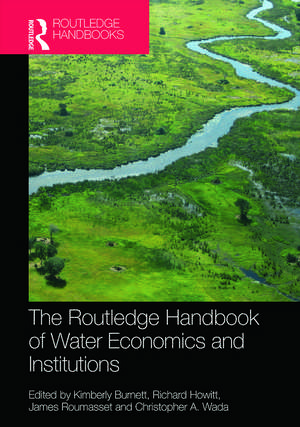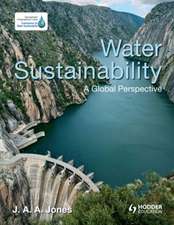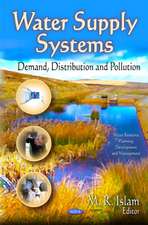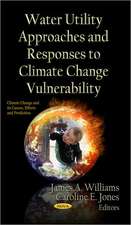Routledge Handbook of Water Economics and Institutions: Routledge Environment and Sustainability Handbooks
Editat de Kimberly Burnett, Richard Howitt, James A. Roumasset, Christopher A. Wadaen Limba Engleză Hardback – 11 dec 2014
Socially efficient water use does not generally coincide with private decisions in the real world, however. Examples of mechanisms designed to incentivize efficient behavior are drawn from agricultural water use, municipal water regulation, and externalities linked to water resources. Water management is further complicated when information is costly and/or imperfect. Standard optimization frameworks are extended to allow for coordination costs, games and cooperation, and risk allocation. When operating efficiently, water markets are often viewed as a desirable means of allocation because a market price incentivizes users to move resources from low to high value activities. However, early attempts at water trading have run into many obstacles. Case studies from the United States, Australia, Europe, and Canada highlight the successes and remaining challenges of establishing efficient water markets.
| Toate formatele și edițiile | Preț | Express |
|---|---|---|
| Paperback (1) | 352.95 lei 6-8 săpt. | |
| Taylor & Francis – 12 oct 2017 | 352.95 lei 6-8 săpt. | |
| Hardback (1) | 1245.12 lei 6-8 săpt. | |
| Taylor & Francis – 11 dec 2014 | 1245.12 lei 6-8 săpt. |
Din seria Routledge Environment and Sustainability Handbooks
- 8%
 Preț: 446.50 lei
Preț: 446.50 lei -
 Preț: 344.05 lei
Preț: 344.05 lei -
 Preț: 345.96 lei
Preț: 345.96 lei -
 Preț: 375.80 lei
Preț: 375.80 lei -
 Preț: 341.55 lei
Preț: 341.55 lei -
 Preț: 332.04 lei
Preț: 332.04 lei - 15%
 Preț: 427.16 lei
Preț: 427.16 lei -
 Preț: 363.04 lei
Preț: 363.04 lei - 9%
 Preț: 1350.07 lei
Preț: 1350.07 lei - 8%
 Preț: 445.41 lei
Preț: 445.41 lei - 26%
 Preț: 1359.11 lei
Preț: 1359.11 lei - 25%
 Preț: 1223.03 lei
Preț: 1223.03 lei -
 Preț: 449.41 lei
Preț: 449.41 lei - 15%
 Preț: 441.09 lei
Preț: 441.09 lei - 22%
 Preț: 352.95 lei
Preț: 352.95 lei - 25%
 Preț: 1228.29 lei
Preț: 1228.29 lei - 26%
 Preț: 1218.32 lei
Preț: 1218.32 lei - 26%
 Preț: 1189.60 lei
Preț: 1189.60 lei -
 Preț: 460.58 lei
Preț: 460.58 lei - 25%
 Preț: 1192.62 lei
Preț: 1192.62 lei - 11%
 Preț: 309.28 lei
Preț: 309.28 lei - 15%
 Preț: 480.51 lei
Preț: 480.51 lei - 26%
 Preț: 1187.85 lei
Preț: 1187.85 lei - 18%
 Preț: 1565.66 lei
Preț: 1565.66 lei - 15%
 Preț: 509.71 lei
Preț: 509.71 lei - 23%
 Preț: 410.54 lei
Preț: 410.54 lei - 26%
 Preț: 1356.60 lei
Preț: 1356.60 lei - 25%
 Preț: 1221.45 lei
Preț: 1221.45 lei - 18%
 Preț: 1558.26 lei
Preț: 1558.26 lei - 25%
 Preț: 1218.92 lei
Preț: 1218.92 lei - 11%
 Preț: 350.19 lei
Preț: 350.19 lei - 25%
 Preț: 1260.99 lei
Preț: 1260.99 lei - 18%
 Preț: 1563.17 lei
Preț: 1563.17 lei - 26%
 Preț: 1188.43 lei
Preț: 1188.43 lei -
 Preț: 356.63 lei
Preț: 356.63 lei - 25%
 Preț: 1220.17 lei
Preț: 1220.17 lei - 15%
 Preț: 507.27 lei
Preț: 507.27 lei
Preț: 1245.12 lei
Preț vechi: 1672.51 lei
-26% Nou
Puncte Express: 1868
Preț estimativ în valută:
238.31€ • 245.59$ • 201.20£
238.31€ • 245.59$ • 201.20£
Carte tipărită la comandă
Livrare economică 03-17 martie
Preluare comenzi: 021 569.72.76
Specificații
ISBN-13: 9780415728560
ISBN-10: 0415728568
Pagini: 426
Ilustrații: 93 black & white illustrations, 38 black & white tables, 55 black & white line drawings
Dimensiuni: 174 x 246 x 28 mm
Greutate: 0.88 kg
Ediția:1
Editura: Taylor & Francis
Colecția Routledge
Seria Routledge Environment and Sustainability Handbooks
Locul publicării:Oxford, United Kingdom
ISBN-10: 0415728568
Pagini: 426
Ilustrații: 93 black & white illustrations, 38 black & white tables, 55 black & white line drawings
Dimensiuni: 174 x 246 x 28 mm
Greutate: 0.88 kg
Ediția:1
Editura: Taylor & Francis
Colecția Routledge
Seria Routledge Environment and Sustainability Handbooks
Locul publicării:Oxford, United Kingdom
Public țintă
PostgraduateCuprins
Part 1: Principles and Overview 1. Global Outlook for Water Scarcity, Food Security, and Hydropower Mark W. Rosegrant 2. Water Scarcity and the Demand for Water Markets Richard Howitt 3. Ordering Extraction from Multiple Aquifers James Roumasset and Christopher A. Wada 4. Integrating Demand-Management with Development of Supply-Side Substitutes James Roumasset and Christopher A. Wada 5. Optimal Conjunctive Water Use over Space and Time Sittidaj Pongkijvorasin and James Roumasset Part 2: Private Behavior and Regulatory Design 6. Strategic Behavior and Regulation over Time and Space C.-Y. Cynthia Lin and Lisa Pfeiffer 7. Water Allocation under Distribution Losses: A Perspective Ujayant Chakravorty and Yazhen Gong 8. The Good, Bad, and Ugly of Watershed Management Kimberly Burnett, James Roumasset and Christopher A. Wada 9. Externalities and Water Quality Renan Goetz and Angels Xabadia 10. Groundwater Use and Irrigated Agriculture in California: Dynamics, Uncertainty, and Conjunctive Use Keith Knapp and Kurt Schwabe Part 3: Institutions and Information 11. Institutions for Managing Ground and Surface Water and the Theory of the Second-Best Karl Jandoc, Richard Howitt, James Roumasset and Christopher A. Wada 12. Towards an Economics of Irrigation Networks Karl Jandoc, Ruben Juarez and James Roumasset 13. Real-Time Information and Consumption: What Can Water Demand Programs Learn from Electricity Demand Programs? John Lynham and Nori Tarui 14. Water Scarcity and Water Institutions Ariel Dinar and Yacov Tsur 15. Managing Climate Risks through Water Trading Bonnie Colby, George Frisvold and Matthew Mealy Part 4: Water Markets and Institutions around the World 16. A California Postcard: Lessons for a Maturing Water Market Ellen Hanak 17. Water Trading Opportunities and Challenges in Europe Gonzalo Delacámara, Carlos Mario Gómez and Josefina Maestu 18. Water Trading in Australia: Understanding the Role of Policy and Serendipity Lin Crase, Sue O’Keefe, Sarah Wheeler and Yukio Kinoshita 19. Tradeoffs: Fish, Farmers, and Energy on the Columbia Ray Huffaker 20. Water Sales, Pecuniary Externalities and Local Development: Chinatown Revisited Gary D. Libecap 21. Agricultural Water Management at the Village Level in Northern China Qiuqiong Huang, Jinxia Wang, Siwa Msangi, Scott Rozelle and Jikun Huang 22. Implementing the European Water Framework Directive in Greece: An Integrated Socio-Economic Approach and Remaining Obstacles Phoebe Koundouri and Osiel González Dávila 23. Water Conservation and Trading – Policy Challenges in Alberta Canada Henning Bjornlund and K.K. Klein
Notă biografică
Kimberly Burnett is an Associate Specialist with the University of Hawaii Economic Research Organization. She has an extensive interdisciplinary background with extramural projects focusing on invasive species management; ecosystem service valuation; and system approaches to terrestrial, water, and marine ecosystems. She has authored numerous book chapters and peer-reviewed journal articles.
Richard Howitt is currently Professor Emeritus in Agricultural and Resource Economics at the University of California at Davis. He has been a faculty member at UC Davis since 1975. His teaching covered courses in resource economics. Current research interests are in disaggregated economic modeling, market mechanisms, and dynamic stochastic methods applied to water resources.
James Roumasset is a Professor in the Department of Economics at the University of Hawaii, Manoa. His research spans a variety of topics, including water and watershed management, energy economics, the new institutional economics, development microeconomics, and sustainable development. He has published over 50 peer-reviewed journal articles, three books, and numerous book chapters.
Christopher A. Wada is a Research Economist with the University of Hawaii Economic Research Organization. His work focuses primarily on various aspects of water management including groundwater pricing, watershed conservation, and assessment of supply-side alternatives. His research has been published in peer-reviewed journals, encyclopedias, and handbooks.
Richard Howitt is currently Professor Emeritus in Agricultural and Resource Economics at the University of California at Davis. He has been a faculty member at UC Davis since 1975. His teaching covered courses in resource economics. Current research interests are in disaggregated economic modeling, market mechanisms, and dynamic stochastic methods applied to water resources.
James Roumasset is a Professor in the Department of Economics at the University of Hawaii, Manoa. His research spans a variety of topics, including water and watershed management, energy economics, the new institutional economics, development microeconomics, and sustainable development. He has published over 50 peer-reviewed journal articles, three books, and numerous book chapters.
Christopher A. Wada is a Research Economist with the University of Hawaii Economic Research Organization. His work focuses primarily on various aspects of water management including groundwater pricing, watershed conservation, and assessment of supply-side alternatives. His research has been published in peer-reviewed journals, encyclopedias, and handbooks.
Recenzii
"The handbook presents essays on a variety of key water resources problems from integrated surface water-groundwater management to the design of water markets, emphasizing analytical techniques for finding solutions. The handbook would be excellent for graduate level water management courses and for top level water managers who value the ability to conceptualize problems and solution techniques. Excellent case studies of integrated water management and water markets are presented." – Charles (Chuck) Howe, Professor Emeritus of Economics, University of Colorado-Boulder, USA.
"This book brings many of the world's most eminent water economists together to provide insights on the modern and future management of water locally, and globally. Readers will find the diverse perspectives and approaches illuminating on one of the world's greatest challenges - managing water for growing populations and a changing climate." – Jay R. Lund, Director, Center for Watershed Sciences, Professor of Civil and Environmental Engineering, University of California – Davis, USA.
"This volume offers an extensive treatment of 'frontier' issues in water resource economics and policy, with contributions from the field’s eminent scholars. On topics from agriculture to urban use, and from pollution to water scarcity, it will become a go-to reference for students and researchers alike." – Sheila Olmstead, Associate Professor, LBJ School of Public Affairs, The University of Texas at Austin, USA.
"This book brings many of the world's most eminent water economists together to provide insights on the modern and future management of water locally, and globally. Readers will find the diverse perspectives and approaches illuminating on one of the world's greatest challenges - managing water for growing populations and a changing climate." – Jay R. Lund, Director, Center for Watershed Sciences, Professor of Civil and Environmental Engineering, University of California – Davis, USA.
"This volume offers an extensive treatment of 'frontier' issues in water resource economics and policy, with contributions from the field’s eminent scholars. On topics from agriculture to urban use, and from pollution to water scarcity, it will become a go-to reference for students and researchers alike." – Sheila Olmstead, Associate Professor, LBJ School of Public Affairs, The University of Texas at Austin, USA.
Descriere
This Handbook aims to expand the scope of efficient water use to include allocation of sources and quantities across uses and time, as well as integrating demand-management with supply-side substitutes. Mechanisms to incentivize efficient behavior are discussed in the contexts of perfect and imperfect information. Case studies from the United States, Australia, Europe, and Canada highlight the successes and remaining challenges of establishing efficient water markets.









